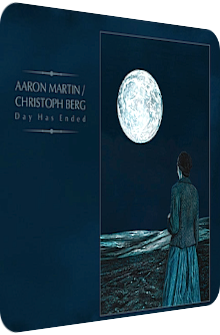
Aaron Martin & Christoph Berg
Day Has Ended
2013
A split release that really, truly works aesthetically is rarely ever the case; Moscow-based Dmitry Taldykin, runner of Dronarivm Records, and its curator Bartosz Dziadosz make sure that the magic unfolds in the case of Day Has Ended. On this eight-track split album which comes in both a limited edition of 250 CD’s as well as a digital incarnation – available to order and fully streamable at Bandcamp – the label runner unites the compositions of multi-instrumentalist Aaron Martin from Topeka, Kansas and chamber music composer Christoph Berg aka Field Rotation from Berlin. Each artist is given the opportunity to come up with four tracks which target the cycle of a day and the light-related cue states that come with it. Sure enough, this concept is as old as mankind itself, with Calgary’s Valiska and his aptly titled long-form piece of 24 minutes A Day As A Blade Of Grass (Inner Ocean Records, 2013) being one of the recent examples which transformed this well-known scourge for mankind into music. Forget about the day-related notion for a moment, as Aaron Martin & Christoph Berg do not simply succeed by doing the concept justice, but due to the cleverly interspersed vestibules between their tracks. If I would not know better, I’d say that both artists worked together on all pieces; the synergetic effects are that big. Both gentlemen rely heavily on stringed instruments – cellos, violins, lutes, double bass – and ennoble them with a few outstanding surprises I do not want to mention beforehand. Martin’s vision is a tad more glistening and staccatofied whereas Berg’s compositions are mercilessly drone-based, but both gentlemen maintain and nurture contrapuntal formations awash with crepuscular twilight and shadiness. Strongly electro-acoustic and much more analogue than rooted in digital climes, Day Has Ended may be stringent and cohesive, but is struck by embroidered dissonances and disturbances. What may those be?
Aaron Martin’s opener Slow Wake is a feast for the senses in that it is as bewildering as it is enlightening. Simultaneously arcane and joyously pointillistic, it launches in a rather threnodic fashion, with dunly plinking lute vesicles and that kind of portent which carries the implication of a cold day that is yet to come. The downwards cascading shrapnel of the pristine strings is coated in an alloy of bitter-sweet semi-sorrowfulness, but one minute into the piece and the arrangement lightens up, now sporting cosmic pulses, violin-based legato coils and cautiously placed double bass riverbeds which successfully camouflage the fragility of all involved layers. Burl then continues to emit a different kind of duality: a Mediterranean-medieval five-note string melody functions as the base frame for its lachrymose Baroque – and hence comparatively futuristic – counterparts which twirl in higher tone regions. The mood of the multilayered sequences as played on the violin or cello is hard to pinpoint, as their physiognomy is torn between sanguine solemnity and aerose arcana. This piece, to my mind, offers the most dreamlike state of Aaron Martin’s four compositions, dreamlike in the true sense of the word: hard to grasp, and the second you want to dissect the innermost core, it vaporizes.
Comfort Of Shadow follows and is a straightforward arrangement in that its title matches and foreshadows the endemic dichotomy, for shadows are like rain or death; there are songs of all genres that glorify these states and conditions, but usually function as contraventions to society’s denotative points of view. Instead of viewing the topic from a melodramatic or histrionic angle, the Kansas-based multi-instrumentalist tones down the incrementally bucolic kaleidoscopes of the first two tracks, yet changes the appearance decidedly by streamlining the formerly firefly-evoking tones and moulding them into a proper Drone structure. Gregorian chants in front of a black backdrop of nothingness, abyssal contrabass buzzes and an ensuing thermal heat of the heterodyned kind interpolate the snugness, but as expected a countermovement takes place and merges these simmering strings of vigor with a shadier (!) polyvalent timbre. Rising both in spirit and in pitch as it progresses, Comfort Of Shadow comes down to this: it stresses the comfort level in its first moment and then worships the shadows in its second part. Aaron Martin’s final tune is called Night Never Came, and believe it or not, this piece breathes clichés and stereotypes thanks to a Gothic pipe organ which drones through the cryptical vault… or vaulted crypt. What sounds like an attempt to pan this piece could not be farther from my impression. The oomph of the organ is gargantuan! On top of it, the girdling helix of lamenting strings amplifies the cataclysmic notion. This saturated apotheosis can be felt twice, emotionally and physically. A majestic apparition.
Christoph Berg’s quartet of tracks is up next, and as I have implied in the opening paragraph already, it is easy to see why his compositions harmonize so overly well with Aaron Martin’s, as the foundation or instrumental pool remains largely the same, with only a few exceptions. The distinctive factors arrangement-wise would be the greater wideness and a milder tonality in Berg’s presentation. Pillows showcases this splendidly: after the kick-off of a darkly droning cello, its complexion lightens up thanks to the circumlocutory sinews which emit mountainous vistas and erbaceous meadows. The only clinging device on this piece is a silkened piano. Fathoming out the interdependence of sound, sustain and silence, Berg’s drone washes are undulations not unlike whitecapped pillows, no, billows. The second submission Today Has Been Alright is his six-minute centerpiece, loaded with Baroque contemplations that circumvent the effervescence the title so aptly suggests. Sorrowful violins are stacked onto a partially pentatonic piano polyphony, incidentally the only comparably playful infusion of the whole soundscape. Mercurially gaseous, the mood cannot be coined. Short streaks of luck are enmeshed with streams of uncertainty. Today Has Been Alright lives up to its name; this day was certainly not entirely elating.
Eventual delight, however, comes in the shape of Things Are Sorted, Finally. Warm and embracing cello rivers float through the bass-infused scenery, contentment and satisfaction swirl in-between the thankful runlets, with a two-note melody on a towering violin being grafted onto the gently floating cascades. A panoramic piece with no sudden paroxysm or unwanted intrusion whatsoever, it is the only artifact of the split release which is refreshingly self-explanatory; title and music work in tandem, there is neither witticism nor a secret shadow of a doubt present. Granted, Things Are Sorted, Finally is not hymnic, but the timbre certainly resembles the unflinchingly joyful aurora of John Adams’ modern classical four-part anthem Shaker Loops (1978). Christoph Berg’s last piece Coda does not leave said trails and is situated in a similar context, almost feeling like an appendix to the blissful diorama. Offering the highest strings and most gracious piano flecks, the gestalt of Coda unchains both feelings of being delighted and enlightened, with grains of sorrow injected to lessen the overwhelming effulgence in the right moments. Aqueous harp tones glow in adjacency to the three-note movement all the while a certain tiredness is intended and not just coincidentally interwoven into this piece. Despite being a split LP, Day Has Ended has come full circle: Aaron Martin’s opener transparently induces the phase of awakening, with Christoph Berg’s final piece as its fitting… coda.
Day Has Ended shows the masterful realization of the ubiquitous concept of a split release. Usually, split releases are created out of necessity in order to either feature a B-side to a title track or to fuse two or more compositions which turn out to be only halfheartedly similar to each other, with a label then issuing a press blurb that tries to convince the listener of the similarities. Here, however, things are shiny and astute. Dronarivm’s executives Dmitry Taldykin and Bartosz Dziadosz do not exaggerate when praising the commonalities and interconnections between both artists. I would love to know whether the topic has been given to both artists and they worked on it separately, or whether they communicated their ideas and showed the interim stages of certain sections or compositions to each other during the production phase. Either way, Day Has Ended is strikingly harmonious on virtually all possible levels: the stringed instruments are all over, in and around the atmosphere, the sub-motifs of dreamlike states as well as coping with stress and pondering are firmly in place, and last but not least, the concept of designedly disturbing seraphic structures traversed by mephitic, diabolic stems is something I would expect from a Glitch release full of alkaline jitters and jagged static noise protuberances, but not necessarily from a Drone record, but there you have it. Aaron Martin & Christoph Berg create string-heavy twilight sceneries, with the former artist concentrating on a narrower, more intimate layer entanglement (bar the brutish Night Never Came!), and the latter widening the perceived size of the room as well as the luminosity of elation.
Further listening and reading:
- You can purchase and fully stream Day Has Ended at Bandcamp.
- Twitter galore: Aaron Martin – @amprisonwine, Christoph Berg – @_christophberg & Dronarivm – @dronarivm.
Ambient Review 266: Aaron Martin & Christoph Berg – Day Has Ended (2013). Originally published on Sep. 25, 2013 at AmbientExotica.com.
